Pioneering Precision: How Big Data is Transforming Personalized Medicine

In a time when personalized solutions are reshaping industries, Harpreet Singh’s work explores the profound influence of Big Data on revolutionizing personalized medicine. As healthcare increasingly integrates technology with biology, Big Data serves as the catalyst for understanding patient-specific traits, such as genetic profiles, lifestyle factors, and environmental influences. This approach enables the development of precise medical treatments tailored to individual needs, moving beyond the traditional “one-size-fits-all” paradigm. By leveraging advanced analytics and predictive models, this research demonstrates how Big Data transforms patient care, enhancing treatment efficacy, minimizing adverse effects, and paving the way for a future of precision healthcare.
Traditional medicine often relies on generic approaches, but data reveals significant variability in patient responses to treatments. Big Data bridges this gap by analyzing vast datasets to understand patient-specific factors such as genetic information, lifestyle, and clinical history. This evolution promises improved outcomes and minimizes adverse effects, redefining patient care.
The Role of Genomics and Data Integration
Genomic advancements form the backbone of personalized medicine. Sequencing costs have plummeted, making genetic profiling widely accessible. This affordability enables deeper exploration of genetic predispositions and their impact on treatment efficacy. Complemented by the expansion of electronic health records (EHRs) and biobanks, healthcare providers now have unprecedented access to longitudinal patient data.
By integrating diverse data sources, Big Data analytics identifies correlations previously undetectable. For example, pharmacogenomic tests reveal how genetic variations influence drug metabolism, ensuring precise treatment plans. This comprehensive approach marks a departure from trial-and-error methodologies, fostering efficiency in medical interventions.
Data-Driven Insights in Oncology
Big Data’s impact is particularly profound in oncology. Genetic profiling of tumors facilitates targeted therapies tailored to an individual’s genetic makeup. Insights gleaned from analyzing cancer biomarkers have revolutionized early detection and prognosis.
Molecularly guided therapies exemplify this transformation. Patients receiving such treatments experience extended progression-free survival compared to standard therapies. Moreover, targeted treatments significantly reduce side effects, enhancing the quality of life for cancer patients. These strides underscore the potential of data-driven strategies in combating life-threatening diseases.
Managing Chronic Diseases Through Predictive Analytics
Chronic diseases such as diabetes and cardiovascular disorders benefit immensely from predictive models powered by Big Data. Machine learning algorithms analyze historical data to predict patient responses to medications, reducing the likelihood of adverse reactions.
Technological innovations, such as artificial pancreas systems, integrate real-time glucose monitoring with AI-driven insulin regulation. These advancements optimize disease management, improving patient outcomes while reducing healthcare costs. Similarly, Big Data helps identify novel risk factors, enabling proactive interventions for conditions like hypertension and heart disease.
Overcoming Challenges in Implementation
Despite its promise, integrating Big Data in personalized medicine faces hurdles. Data privacy and security remain critical concerns. The increasing interconnectedness of medical devices amplifies the risk of cyberattacks, necessitating robust regulatory frameworks.
Data fragmentation also poses a challenge. With healthcare organizations relying on multiple unstructured data sources, achieving seamless integration demands standardization and interoperability. Furthermore, ethical considerations, such as algorithmic bias and equitable access to technology, require continuous vigilance to ensure fair treatment for all patients.
The Future of Personalized Medicine
Advancements in AI and machine learning are set to accelerate the adoption of personalized medicine. Predictive analytics will enable early detection of diseases, while wearable health devices will provide continuous real-time data, enhancing patient monitoring.
Collaborative efforts between healthcare providers, technology companies, and researchers will drive innovation. These partnerships aim to shorten drug development timelines and improve diagnostic accuracy. As genomic databases grow, the insights generated will further refine treatment strategies, paving the way for a proactive healthcare model.
In conclusion, Harpreet Singh’s expertise in integrating Big Data with personalized medicine marks a revolutionary step in modern healthcare. By leveraging advanced analytics, this approach enables the development of highly tailored treatments that consider an individual’s genetic, environmental, and lifestyle factors. This personalized strategy enhances treatment efficacy by targeting interventions more precisely while reducing adverse effects and unnecessary costs. As the healthcare industry embraces this data-driven paradigm, it paves the way for a more patient-centric model of care. This transformative shift holds the potential to redefine health and wellness, making medical treatments not only more effective but also more accessible and efficient.





